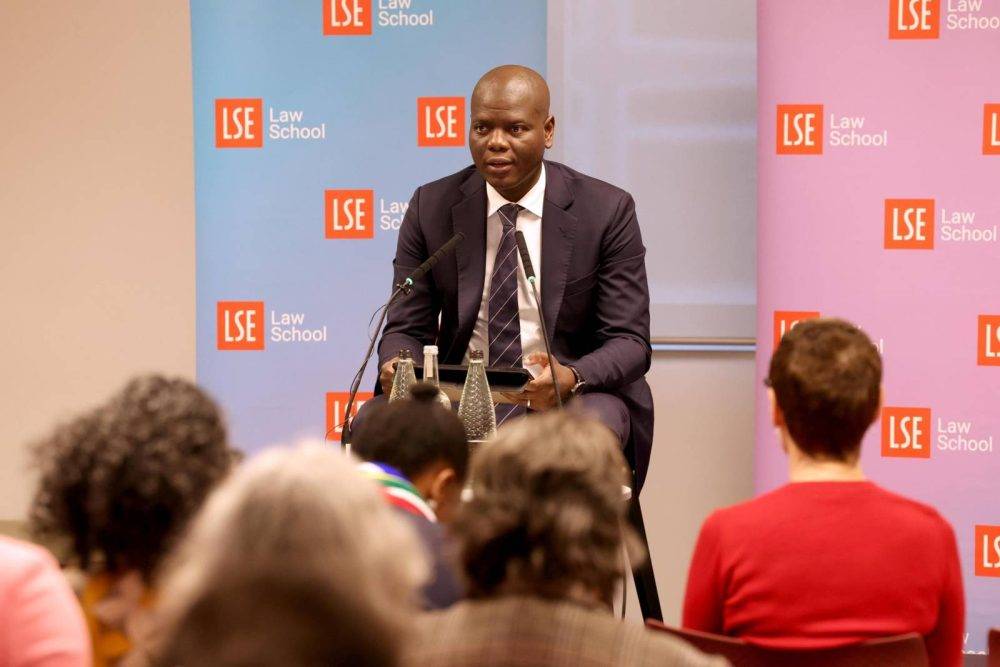
Dirco minister, Ronald Lamola. (@RonaldLamola/X)
International Relations and Cooperation Minister Ronald Lamola used the inaugural Aziz Pahad Peace, Security and Human Rights Dialogue to deliver a scathing critique of “organisations like AfriForum”, accusing them of undermining the values enshrined in the Constitution and opposing the country’s transformation efforts.
“Organisations like AfriForum and their ilk, who pursue a different path to that of our Constitution, do not only stand against the reconstruction of a new South Africa, they also stand against the will of the people,” Lamola said.
The government has repeatedly blamed the civil rights organisation for its worsening relationship with the Trump administration in the US, saying AfriForum is exaggerating attacks on farmers in the country.
It has also slammed the group for saying that white farmers’ land is being seized under the Expropriation Act, which it is not. The Democratic Alliance (DA) has gone to court to challenge the constitutionality of the new law.
Lamola’s comments came as he urged the government of national unity (GNU) to recommit to the founding values of the Constitution and deepen consensus through dialogue and negotiation.
Prior to his comments about AfriForum, while speaking generally about foreign policy, the minister said: “With those who hold different views and perceptions, perhaps we must deepen consensus-building through dialogue and negotiations.”
Lamola also took a swipe at the DA, the ANC’s biggest partner in the coalition government.
“All of us, including all members in the government of national unity, despite our different political persuasions, must pursue, as did Aziz Pahad with deep commitment, the goal of transforming our country into a non-racial, non-sexist and united South Africa,” he said.
“The GNU also took leaf from this strong foundation when it declared as follows in its statement of intent: ‘Foreign policy based on human rights, constitutionalism, the national interest, solidarity, peaceful resolution of conflicts, to achieve the African Agenda 2063, South-South, North-South and African cooperation, multilateralism and a just, peaceful and equitable world.’”
It was thus “shocking”, Lamola said, that the DA argued that the government was “just implementing ANC policy in foreign affairs”, when the partners had agreed to the statement of intent. “And it is what we continue to implement.”
“The government of national unity does not supersede the Constitution. The statement of intent itself commits to constitutionalism. It can’t be that when we implement what is in the Constitution, in the Foreign Services Act, the national interest document and the national development plan, we are said to be acting unilaterally by the DA.
“That is what we continue to implement. Until we are told otherwise by South Africans, this is the plan,” he added.
He cited the Basic Education Laws Amendment Act, the National Health Insurance Act and the Expropriation Act as examples of transformative legislation guided by constitutional values.
He called on all political actors to emulate the example of the late former deputy minister of international relations Pahad, who was honoured at Monday’s event. Lamola described Pahad as a “true progressive internationalist” and a central figure in the crafting of South Africa’s post-apartheid foreign policy.
“Known otherwise as the ‘insurgent diplomat’, as the title of his biography suggests, Aziz Pahad will be remembered … as a man of deep conviction and principle,” Lamola said.
Pahad, who died in 2023 at the age of 82, was known for his roles in conflict mediation and multilateral diplomacy, particularly in Africa and the Middle East. He was a key figure in the “Renaissance Coalition” that shaped South Africa’s early foreign policy under presidents Nelson Mandela and Thabo Mbeki and then-minister Nkosazana Dlamini-Zuma.
Lamola said Pahad’s legacy lives on in South Africa’s commitment to multilateralism, solidarity and the peaceful resolution of conflicts.
“Aziz Pahad played a very active role in South Africa’s mediation efforts … in the Israeli-Palestinian peace process and in negotiations in the Democratic Republic of Congo, Burundi and Angola,” he said. “He always understood that resolutions should be pursued through dialogue.”
Linking Pahad’s life to the broader post-apartheid project, Lamola highlighted the importance of redress and constitutionalism. He warned against complacency after six national elections, arguing that the dual legacy of apartheid — prosperity for whites and impoverishment for blacks — remains unresolved.
Lamola also stressed the importance of Africa’s own constitutional frameworks, such as the Constitutive Act of the African Union, the New Partnership for Africa’s Development and the African Peace and Security Architecture, saying Pahad would have expected South Africa to champion these initiatives.
The dialogue comes amid growing global instability. Lamola referenced data from the Stockholm International Peace Research Institute which indicated that, in 2024, at least 18 of the world’s 46 active armed conflicts occurred in sub-Saharan Africa.
He reaffirmed South Africa’s role as a proponent of peace, noting the country’s support for the Southern African Development Community’s withdrawal of regional forces from the eastern Democratic Republic of the Congo. The decision will be implemented in phases, starting with the reopening of Goma Airport to allow for equipment relocation.
Turning to economic justice, Lamola warned against the new “scramble for Africa” which he described as disguised under slogans like “Africa rising” but driven by resource extraction.
“Aziz Pahad was just as distraught about the new scramble for Africa … we must be vigilant,” he said.
Addressing South Africa’s sometimes strained relations with global powers, Lamola rejected calls for aggressive diplomatic postures.
“I know that there is a yearning for us to show that we’re courageous by trading insults with countries … but we are not in that business,” he said.
“We will remain firm on our principled positions and continue to pursue our national interest in line with diplomatic decorum.”
He noted that while South Africa values trade ties with the US, it is also working to repair tensions and reaffirm its non-aligned stance.



